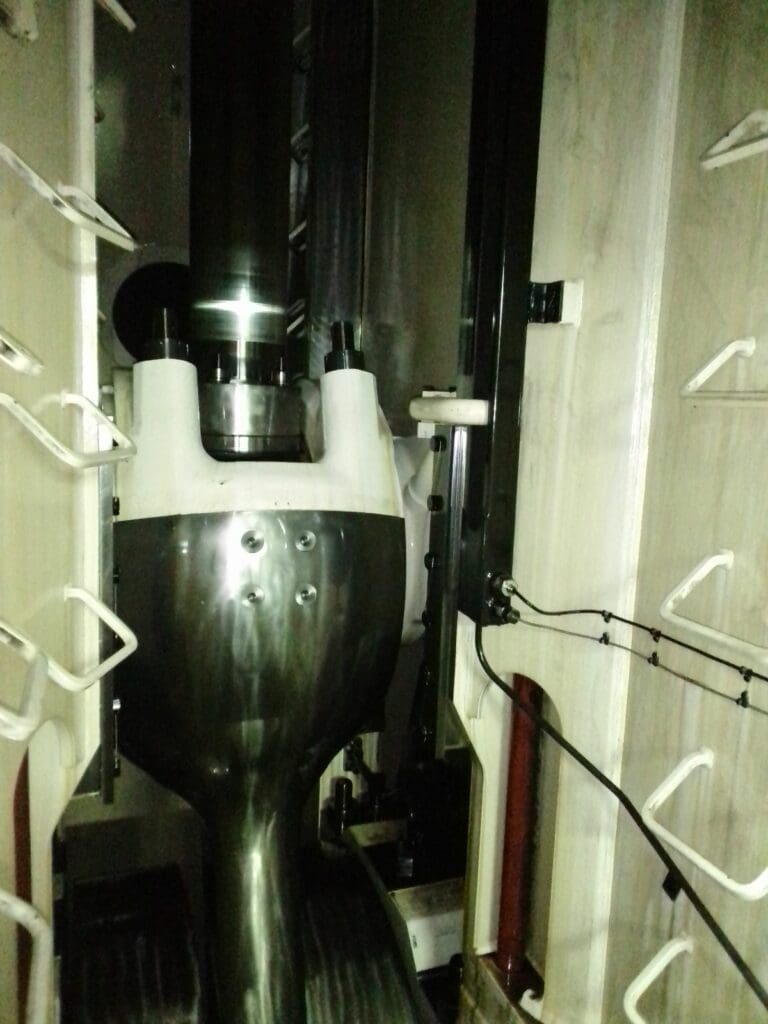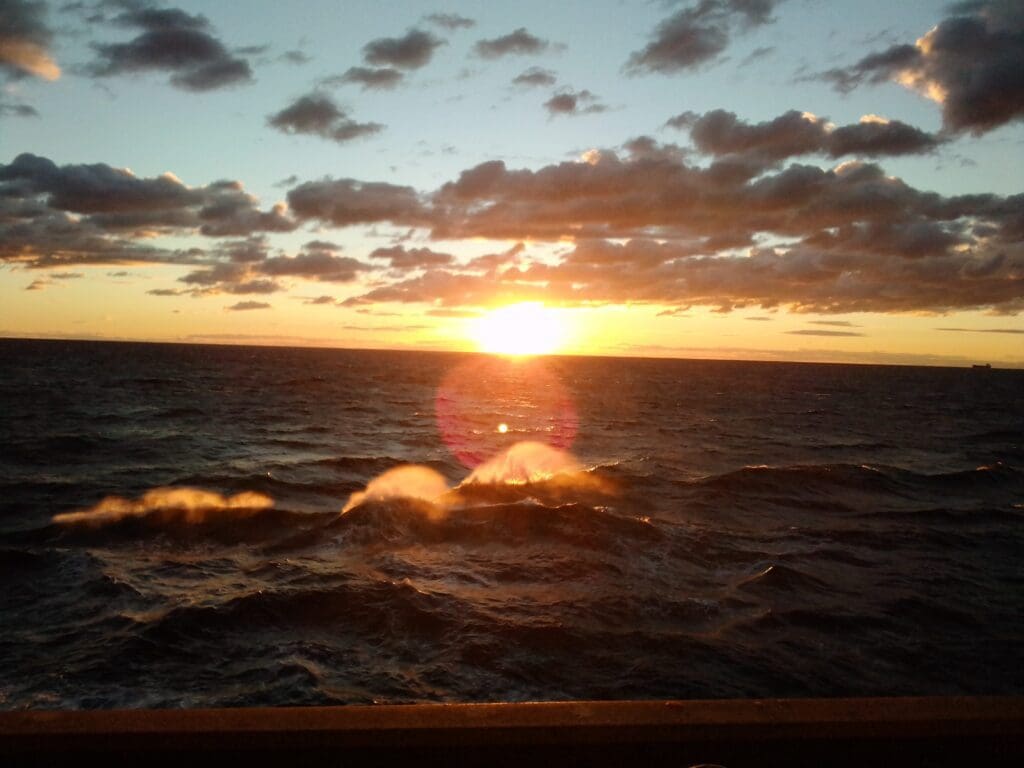Starting a career as a Marine Engineer
Ifunanya Kanu is a Marine Engineer based in Nigeria. She studied Marine Engineering at the University of Cebu in the Philippines after winning a scholarship.
In this article she describes her career as a Marine Engineer so far and shares advice to other engineers, particularly women, starting in the profession of Marine Engineer.


Background and path to studying engineering
Could you give a brief description of your background and what led you to study marine engineering?
When I was a child, we had a troublesome two-stroke gasoline generator in our home. While my father worked on it, my job was to standby with the flashlight, directing it to make the parts he was working on clearly visible. On the nights it would sputter to life, I felt elated and awed by what seemed to be a brilliant but challenging game of hide-and-seek.
Were you interested in science and engineering/ how things work when you were a child?
As a child I was curious to learn how things work and had questions such as:
“Why does water condense on a cold glass not a warm one?”
and
“How do some people’s food flasks manage to keep their lunches hot till afternoon?”
By the time I got into secondary school, I gravitated towards physics because it gave straightforward answers to questions like these.
Was there anyone in your family who guided you towards engineering or towards working at sea?
My father inspired my dream to become an engineer, but I never envisaged I would one day be working at sea.
I gained admission to study Naval Architecture and Marine Engineering at the University of Cebu, Philippines, after writing a scholarship examination organized by the Nigerian government in a bid to boost our country’s seafarer capacity. I studied Naval Architecture and Marine Engineering for two years prior to studying Marine Engineering.
Inspiration
Is there anyone else who has been an inspiration?
My parents have both been exceptionally inspiring to me. My father’s brilliance and humility are things I can only hope to emulate, and my mother is the most determined person I know. The older I get, the more they inspire me because I realize just how many sacrifices they made not just for their children, but for others as well.
Types of equipment and machinery
Could you outline the types of equipment and machinery you have worked on during your career so far?
I have assisted in maintenance of:
a MAN B&W 6G80 ME-C 9.2TII engine,
Hyundai Himsen H25/33 engines, heat exchangers
an Alfa Laval Aalborg OC-TCi boiler,
Hamworthy sewage treatment plants,
and more.
What has been the most interesting work you have ever been involved in?
Anything that involved opening the MAN B&W main engine was something I anticipated highly. It is always an opportunity to see the inside of this imposing structure that the engine room revolves around. These jobs require advance preparation, planning, and participation of almost all engine crew. While each process is detailed in the engine manual, it must be carefully planned for the crew to do a timely and precise job on the day, as the engine is immobilized during the job for a given number of hours. These kinds of jobs can also help the crew work even better together.


Which has been the most troublesome for you as an engineer?
The most troubling thing for me since obtaining my license as an engineer would be reading disturbing reports about seafarer shortages whilst applying to companies demanding in-rank experience for entry level roles. While I do not fully understand the reason for this misrepresentation, it is quite concerning that the industry’s reality and paper narrative seem to be two very different things.
Working at sea
What are the main challenges when working as an engineer at sea?
I think loneliness is one of the challenges when working at sea. While there are a number of people you work and live with onboard, and you may make life-changing friends at sea; the truth remains that oftentimes people want to maintain a bit of professional distance. Also, whilst living with the same people you work with, it can be a bit draining.
What is easier on dry land?
Being close to family especially when emergencies occur.
While at sea, you have to compartmentalize the goings-on at home in order to focus on the job. Otherwise, you risk your life and the lives of people working with you. On land you can just hop on a plane, train or bus and go.
Conditions at sea
Is your role ever uncomfortable because of heat, cramped spaces, bad lighting etc?
The engine room is a noisy place and sometimes you may need to meander beneath pipes to work on some pieces of equipment or perform inspections. The addition of heat when the ship is passing through certain regions, and the poor visibility within these spaces, can make otherwise simple jobs a real test of the engineer’s ability to focus. Concentrating on the task and mentally breaking it down to a step-by-step process boosts confidence and reduces anxiety.
Taking breaks to hydrate is also very important.
How do you manage working and concentrating when there are other people around, the sea is rough, etc?
At the beginning of my cadetship, I felt self-conscious and thought my inexperience was being judged at every turn. But I began reminding myself that other people are onboard to work, earn a living, and go back home to their families. No one is paid specifically to watch you grapple through a learning process. Everyone had to go through the same learning process at some point so do your job shamelessly and get it done. Even if you are laughed at on the first day, you won’t be when you have learnt the task.


Typical week for a marine engineer
Can you describe the type of work during the week for a marine engineer in their first job?
In your first job as an engine cadet, you do what is assigned by the engineers you work with. The tasks each week will vary, and each engineer will have different tasks planned according to the Planned Maintenance System of machinery they maintain. They will discuss these tasks at the daily toolbox meetings, and state how many hands they need to assist. There may also be routine jobs which require the involvement of almost all engine crew such as bunkering or engine overhauls. When you are an engineer, your work is more structured as you become directly responsible for various machinery and executing the PMS for them.
How much of the time is spent engineering and how much with admin, training, cleaning, maintenance, and other tasks?
Tasks such as cleaning are often carried out by the cadets and ratings onboard. The cadet should ideally also spend time in training, learning from engineers onboard and through the company’s competency management system for its seafarers. Some engineers assign cadets maintenance tasks at their discretion, to help them practice what they have learnt over time. Maintenance of machinery onboard is split between the fourth, third and second engineers onboard, while the Chief Engineer performs more of a supervisory role onboard.
Types of engineers
How many engineers are on a ship? What are their different roles?
On a conventional cargo ship, you will have four engineers and a number of engine ratings.
The Chief Engineer plays the role of a liaison between the engine room and the office, communicating its needs such as bunker, chemicals and spares to the technical superintendent. He also oversees bunkering and sludge discharges, while keeping records in the oil record books of bunker and discharges of waste oil. He ensures the crew maintain a safety-first attitude, and equipment and crew in the engine room are safe and sound.
The second engineer is aware of what junior engineers are doing, jobs being done during the day, and is also in charge of some paperwork. The second engineer is responsible for more sensitive and expensive machinery such as the oily water separator, main engine and attendant equipment, and the air-conditioning compressors.
Third engineers cover auxiliary engine maintenance, fuel and lubricating oil purifiers, fuel oil management and attendant machinery maintenance, and air compressors.
Fourth engineers handle boiler and attendant accessories, garbage incineration, waste oil onboard management, sewage treatment and plant management, freshwater production and associated accessories maintenance, fresh and boiler water chemical testing and dosing, and fuel oil onboard testing.
These are not set standards and engineers vary greatly in number and roles from ship to ship.
Women marine engineers
What advice would you give to women marine engineers who are about to start their first role?
Do not be scared.
Fear makes you forget what you know and then you might make both personal and professional mistakes. Be kind to yourself, even on days you feel less than able to. Some days will remind you that you are human and fallible and that’s okay. Just learn from it and move on. Always strive to improve yourself. And lastly, not everything is personal.
You may meet some men who have never worked with a female engineer before and have been raised in cultures where women are not encouraged to do physically strenuous tasks especially when there’s a man around. Be polite but firm about doing your jobs but also know when to ask for help.
What are your tips for feeling confident and not out of place?
Study, observe, lend a helping hand. The more you know, the more confident you will become.
The number of women in all types of engineering is increasing. How can this be helped?
Providing things such as feminine hygiene products, sanitary bins, and well-fitting PPE can go a long way in making the field more appealing to women thinking of joining the profession.
Mentoring
How key is it to have a mentor supporting each individual engineer?
Mentorship is an integral part of Marine Engineering.
A cadet is essentially onboard as a professional mentee in search of mentors in engineers. However, due to the fast-paced, physically taxing nature of the job, sometimes senior engineers just want a good rest after a hard day’s job and are in no mood to answer what might appear to them as basic questions.
In the case you find yourself in a situation where you do not have a direct mentor, rotate through all engineers onboard and assist while observing. After the job is done, pick up the manual and try to answer questions that popped up in your mind while you observed the job. For example:
“Why did the Chief Engineer shine his light on that valve plate and what was he trying to see?”
“How does the second engineer know it is time to refill the main engine accumulators with nitrogen?”
“Why did the third engineer ask me to start taking this temperature every day?”
When you have thoroughly analysed, if the information available to you still does not reveal some answers, approach the engineers when they are relaxed and more inclined to answer your questions. Ask other engine crew such as the fitters and motormen as well, as they have a lot of experience and have probably seen different approaches to the same task. Doing this prepares you to mentor others because you have all this information logically deduced and can explain it simply and systematically.
PPE
Do you have any advice about PPE and uniform for women? (In terms of fit, comfort etc.)
PPE should fit the wearer because a loose sleeve might mean the wearer returns home without a hand. Little things like these can make a big difference in the high-risk environment onboard.
Continuing to learn after university
How can you continue to learn as an engineer after you leave university?
Pay attention to changes in the field. Innovation is always underway, engine manufacturers trying to keep pace with more stringent emission requirements will introduce new technologies which may not have been taught to you in the university. Stay curious and find avenues to learn.
What are the different ways of growing as an engineer?
By teaching and always asking questions. Teach what you think you know to someone else and if you cannot explain its components simply, you need to have a better understanding of the topic. Asking questions motivates your brain to find answers and keeps you learning.


Further reading
Mentioned in this post
Alfa Laval Aalborg OC-TCi boiler
Hamworthy sewage treatment plants
Previous Blog posts


Responses